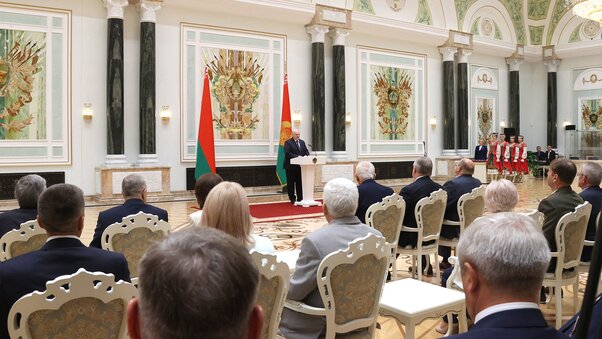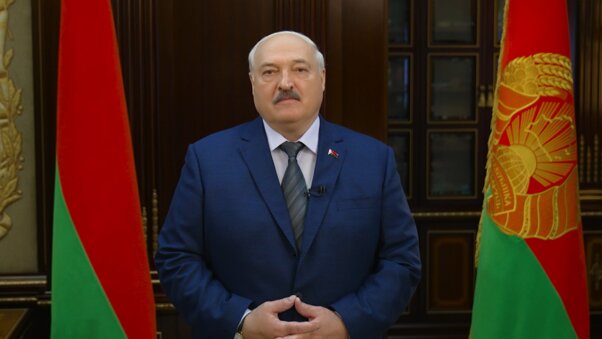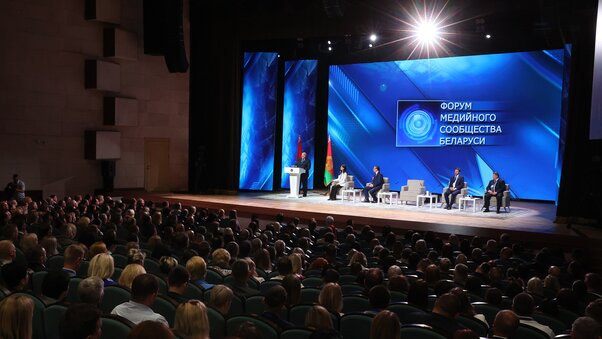Solemn assembly dedicated to Independence Day
- 31
- 41:20
Belarusian President Aleksandr Lukashenko took part in the solemn assembly dedicated to Independence Day.
The head of state noted that on these days Belarusians recall the most important pages of their history. As they mark yet another anniversary of the country’s liberation from Nazi invaders, in their thoughts they travel along the victory roads starting with the liberation of the town of Komarin and ending with heroic Brest Oblast.
“It is our way, the way towards our independence,” Aleksandr Lukashenko stated. “Exactly 80 years ago, on 3 July, after wild years of the occupation a red banner was once again hoisted above the capital city of our Motherland. That banner immediately became a historical symbol of our freedom.”
The President recalled that this image has been preserved in the fabric of the state flag of the Republic of Belarus by the will of the Belarusian nation. The date 3 July became a state holiday – Independence Day – in accordance with the same will of the people.
“This holiday and symbols of our country represent a tribute to the memory of the victorious Soviet nation, a tribute to the memory of Belarusians, who endured all the hardships of the terrible years of war,” the head of state pointed out. “Today we look at those events from the height of thousand years of historical experience. We look into the very depth of centuries. It is the challenge of time, the time when geopolitical risks and threats are aggravated.”
Aleksandr Lukashenko said: “No conceptually new things happen in our life. Neither today nor back in 1941 when hordes from Western Europe invaded our lands. The Belarusian land had already suffered from tornadoes of crusades and floods of blood that razed our way of life to the ground. But the land was reborn time and again and our nation became stronger. This is how the sacred knot of Eastern Slavonic unity was tied. The unity survived wars, feuds, and endless intrigues of political centers of force that replaced one another.”
He noted that milestones of Belarus’ historical development are marked by the change of eras of great power and great shocks. “It is the historic path, on which our Belarusian nation matured, was tempered, and shaped its own national self-awareness,” the head of state stressed.
“I once told our reporters and other ones: we should stop all the debates about whether the local forms of statehood, which replaced each other, were Belarusian or not. It is important but not very significant. There was a people. The people became a nation. What is going on now is important. The end result is important,” he noted.
The President is convinced that without this self-awareness the Great Victory would not have happened and the country would not have existed today. “Neither our country nor any other country across the entire territory of the former Soviet Union,” Aleksandr Lukashenko said.
The President described the Great Patriotic War of 1941-1945 as a pinnacle of a thousand-year-long history of wars and battles of the western civilization and the eastern one.
“We have already closed the chapter on this history once. We will close it again if we have to. Although they can do it without us. Rejection of traditional values and childfree trends have had an effect. Look at who stands at the forefront of the anti-Belarusian and anti-Russian campaigns. Childless politicians. Their line is at an end. They even have no one to pass on their hate genes to. Curtain is about to drop,” the head of state said.
“But with nations of western countries, with those, who live for the sake of the future of their kids and grandkids, we will always find common ground and will come to terms. Nothing and no one will force Belarus to steer away from the road towards peace and creation,” Aleksandr Lukashenko stated.
Aleksandr Lukashenko stated: “A new sacred knot was tied in the sacred Belarusian land back then, 80 years ago. A knot of multiethnic Soviet unity. An even stronger one. We remember sons and daughters of all the USSR republics: western and eastern ones, southern and northern ones. We remember everyone, who looked death in the face, but rose up to fight in order to liberate our Belarus. Everyone knew that the fate of their home area, the fate of their relatives and loved ones was decided here, at this frontier even though they were thousands of kilometers away from this Belarusian frontline.”
The head of state remarked that every Soviet soldier waged a holy war for the future of the huge country that stretched from Brest to Vladivostok and from Murmansk to Tashkent. “They waged it here, in Belarus,” he said. “Belarus remembers heroes. Names of many natives of brotherly republics are immortalized in names of our streets. A mound has been built in their honor and to their glory outside Minsk. Soil for the mound was collected from all corners of the Soviet Union. As great as its concept, the mound towers as a symbol of the Soviet nation, a winner nation.”


